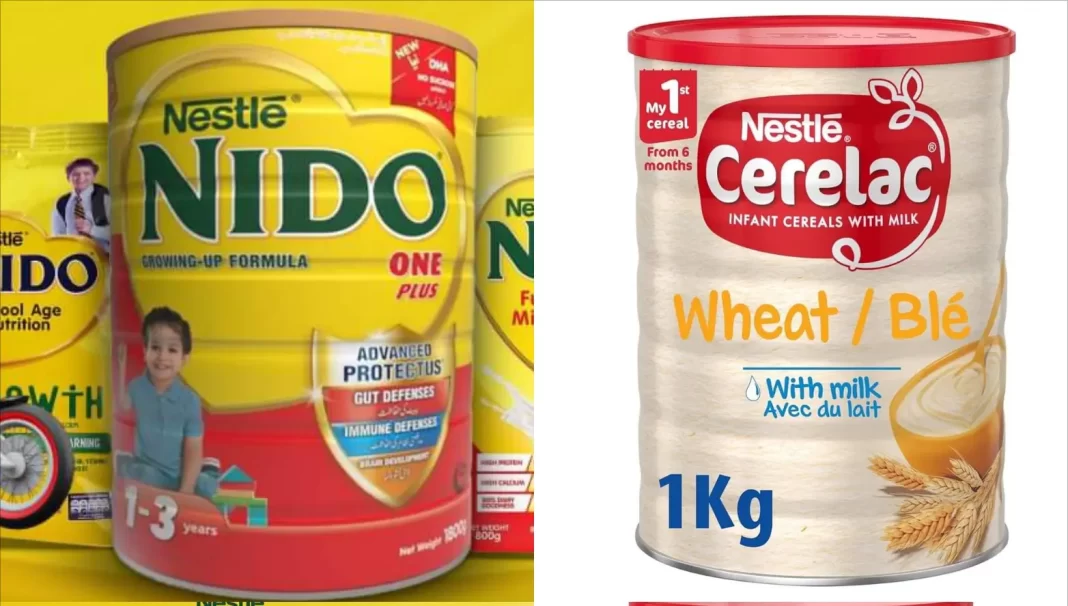By Mo Isa
The National Agency for Food and Drug Administration and Control (NAFDAC) has reassured Nigerians of its commitment to ensure every food and drug they consume is safe.
In response to a recent article published by the media, the agent shaded more light on Nido, Nestle Cerelac and other baby formulas being alleged to have sugar in them. The article specifically said Nestle was adding sugar to baby formula targeting poor countries from Asia and Africa.
The statement by NAFDAC published on its official social media pages and website, on Wednesday, read:
“The attention of the Management of the National Agency for Food and Drug Administration and Control (NAFDAC) has been drawn to The Guardian online publication of 17 April 2024 being circulated widely to the general public via social media stating that ‘Nestle, the world’s largest consumer goods company, adds sugar and honey to infant milk and cereal products sold in many poorer countries, contrary to international guidelines aimed at preventing obesity and chronic diseases.’ The report goes further to state that samples of baby food products sold in Asia, Africa and Latin America were tested and results of analysis, and examination of product packaging revealed added sugar in the form of sucrose or honey in samples of Nido, a follow-up milk formula brand intended for use for infants aged one and above, and Cerelac, a cereal aimed at children aged between six months and two years.
“The Management of NAFDAC wishes to use this medium to reassure the public that the Agency exercises due regulatory diligence in the registration of infant and young children foods distributed and used in Nigeria in line with relevant Codex Alimentarius international food standards (Codex) and more specifically, Nigerian Industrial Standards (NIS). This is applicable to all categories of infant and young children foods distributed by manufacturers, importers, and marketers of infant and young children foods operating within Nigeria.
READ ALSO: FG unveils sustainable empowerment initiatives to enhance economic status of women
“Adequate, optimal nutrition during infancy and early childhood is essential to ensure the growth, health, and development of children to their full potential. The Codex Alimentarius Commission (CAC) implements the Joint FAO/WHO Food Standards Programme, developing international food standards, guidelines, and codes of practice with the mandate to protect the health of consumers and ensure fair international food trade. Nigeria (NAFDAC) is an active participant in these international food standards-setting areas to contribute Nigeria’s positions during food standards development.
“Regarding the mention of Nido follow-up milk formula in the publication, NAFDAC wishes to state that the product is not registered in Nigeria, is not known to the Agency and is not in circulation in Nigeria. The range of Nestle Cerelac infant cereals distributed in Nigeria are duly registered with NAFDAC in line with the Nigerian Industrial Standard for Foods for Infants and Young Children – Processed Cereal Based Foods (NIS 256:2010) and the Codex Standard for Processed Cereal-based Foods for Infants and Young Children (CXS 74-1981 adopted in 1981, revised in 2006, amended in 2017, 2019, and 2023), as well as the applicable NAFDAC regulations for compliance with safety, quality, and labelling requirements. The scope of the standards covers processed cereal-based foods intended for feeding infants as complementary food from the age of six (6) months.
“It is important to mention that these national and international food standards for processed cereal-based foods for infants and young children permit the addition of sucrose, fructose, glucose, glucose syrup or honey to products consisting of cereals which are or have to be prepared for consumption with milk or other appropriate nutritious liquids provided the amount of added carbohydrates from these sources shall not exceed the stated levels of 1.8 g/100 kJ (7.5 g/100 kcal); and specifically the maximum level of added fructose shall not exceed 0.9g/100kJ (3.75g/100kcal).
“For cereals with an added high protein food which are or have to be prepared for consumption with water or other appropriate protein-free liquid, carbohydrates (if sucrose, fructose, glucose, glucose syrup or honey) are added provided the amount of added carbohydrates from these sources shall not exceed 1.2 g/100 kJ (5g/100 kcal); and specifically the maximum level of added fructose shall not exceed 0.6g/100kJ (2.5g/100kcal).
“It is important to note that carbohydrates are made of building blocks of sugars and can be classified according to how many sugar units are combined in their molecule. Glucose, fructose and galactose are examples of single-unit sugars, also known as monosaccharides. Double-unit sugars are called disaccharides, among which sucrose (table sugar) and lactose (milk sugar) are the most widely known.
“Infant and young children’s foods are strictly regulated by NAFDAC in recognition of the vulnerability of the target population and measures are in place to monitor and enforce compliance with the International Code of Marketing of Breast-milk Substitutes and the national regulations – Marketing of Infant and Young Children Food and other Designated Products (Registration, Sales, etc.) Regulations.
“The Agency recently, on 22 March 2024, held a stakeholders’ engagement with members of the Association of Infant Food Manufacturers and Marketers in Nigeria (AIFMN), anchored by the Food Safety and Applied Nutrition (FSAN) Directorate to further drive home the importance and special place of infant and young child nutrition.
“The NAFDAC Management wishes to reassure the public that the Agency is fully alive to her responsibilities of assuring the safety, wholesomeness and quality of infant and young children foods offered for sale in Nigeria in compliance with the relevant standards and regulations.”
Press Release on the Guardian Online Publication “Nestle Adds Sugar to Infant Milk Sold in Poorer Countries” – NAFDAC’s Responsehttps://t.co/XyA2a5RB8w
— NAFDAC NIGERIA (@NafdacAgency) April 30, 2024




